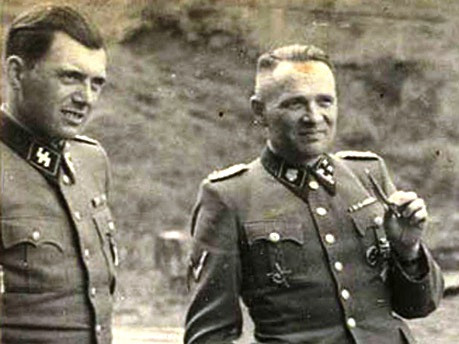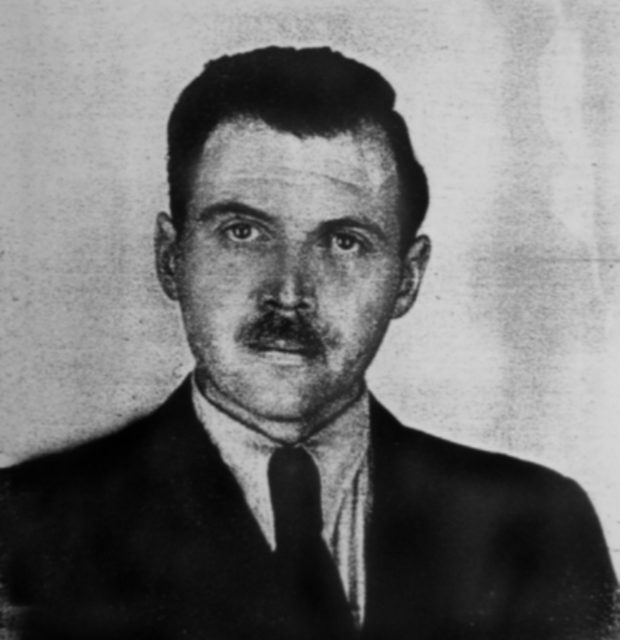Recently, the Israeli Secret Service (Mossad) released their dossier on Joseph Mengele and the world was able to understand where Mengele lived and why they called off the hunt. The file is a fascinating read on one of the longest-running manhunts in history; 40 years until in 1985 when Mengele’s body was traced to a small graveyard in the town of Embu.
So why did the Mossad allow this notorious criminal go free? Why was he never held accountable for the crimes that he had committed? Dr. Josef Mengele, the angel of death, is a name that still brings chills to the spine today even though it is over 70 years ago that the crimes he committed first shocked and disgusted the world. The crimes against humanity Mengele committed are as horrific today as they were when they came to light at the end of the war. This sadistic murderer undertook inhuman experiments with twins and committed thousands of Jewish people to death with a flick of his fingers.

In 1962 Mossad agent, Zvi Aharoni, was in South America on the trail of 40-year-old Wolfgang Gerhard, who was head of the Nazi Youth in Austria and was a committed Nazi long after the war ended. The Mossad agent believed that Gerhard was in contact with Dr. Josef Mengele and was hoping that Gerhard would lead him to Mengele’s hide-out. If this were the case, Aharoni would have no compunction in kidnapping Mengele and returning him to Israel for trial.
Unfortunately, shortly after Gerhard left the most populous city of Brazil, Sao Paulo, he turned down a rough, dirt track and Aharoni was forced to turn back to Sao Paulo as following along such a track was impossible to carry out in secret. Aharoni and his fellow agents decided that it was impossible to investigate the track in secret so they took a picnic and drove down the track until they could see some farm buildings. They then calmly set out their picnic and started munching their sandwiches.
Shortly after they started enjoying their meal, three men emerged from the farm building. Two were obviously Brazilian, but the third was European. The three men were too close to take clandestine photographs, but Aharoni was sure that the man was Mengele. His height and coloring matched the photographs that the Mossad had and, though he had a mustache, he looked similar to the photographic images.
Aharoni was thrilled with the prospect that the Mossad had finally tracked down the angel of death, so he flew to Paris to report to his superiors. Aharoni was certain that they could uplift Mengele in a similar manner to how they had kidnapped Adolf Eichmann from his home in Buenos Aires. Mossad returned Eichmann to Israel where he was tried for his crimes and executed.

Aharoni was astounded when Isser Harel, the head of Mossad at the time, told him to drop the investigation and that the search for Mengele was at an end. Despite being astounded, Aharoni followed his orders and closed the case.
As the search for him had been called off, Mengele lived the rest of his life in peace in Brazil, until his death from a stroke whilst swimming in 1979. Mengele never apologized for his horrific crimes and was never punished for his crimes.
So how did Mengele avoid capture for so long?
In 1945 Mengele had gone into hiding when the Red Army approached Auschwitz. He fled with his ‘medical notes,’ and for the following four years, he worked as a farm laborer in Bavaria. During this time Mengele became infuriated at, what he considered, were lies that were being told about him. He did not believe that he had done anything wrong during his time at Auschwitz.
At this time, he only saw his wife and son infrequently as he was concerned about being discovered. The Allies, on the other hand, were not sure what Mengele’s proper name was. They had several spellings for his name, and as a result, few attempts were made to try and locate him.
Mengele grew increasingly embittered and decided to build a new life for himself, so he made his way to Argentina. There he found a large network of Nazi sympathizers that were able to hide and assist him. Descriptions of his crimes were starting to emerge during the trials at the end of the war, and Mengele found himself attracting a degree of notoriety and he set himself up in grand style. He even worked as a representative of his family’s firm. By the mid-1950s Mengele had divorced his wife, Irene, and was living the high life in Buenos Aries.
He made plans to marry his sister-in-law, Martha Mengele, after the death of his brother. In 1955 he traveled back to Europe under the name of Helmut Gregor to marry Martha. This was no romantic wedding but rather to ensure that she did not marry someone that would cause problems on the board of the Mengele family firm.
He returned to Argentina with his new wife and astoundingly registered with the German embassy under his name with his true date and place of birth and was even issued with a passport in his actual name. He lived so openly that his name was listed in the Buenos Aries telephone directory.
In September 1955, a dossier that had been compiled by a German, Hermann Langbein, was sent to the prosecutor in Bonn with a request that Mengele be prosecuted for his war crimes. Unfortunately, the German legal world was thick with ex-Nazis and Mengele was tipped off that the German authorities were looking into his life, and in March 1959 he decided to move to Paraguay as there was no extradition from that country.
Mengele hated living in a little town called Hohenau in Paraguay. He despised the poverty-stricken farmers of German ancestry that lived in the area, and he considered himself way above them in social standing. He became more nervous when Eichmann was kidnapped and returned to Israel, and he was terrified that he was next. In the latter part of 1960, Mengele fled to Brazil with the assistance of Wolfgang Gerhard, the ex-Nazi Youth Leader.
Mengele did not know that Mossad had continued to search for him and that Aharoni and Willem Stassen had uncovered the link between Mengele and Gerhard. It is strange that in July 1962 the entire search was brought to a grinding halt.
The dossier contained notes from a Mossad historian, Yosef Chen, who wrote that the search was stopped because the Mossad were simply not sure that they had the right man. They did nothing on this first sighting, and the search was mothballed for the next few years.
With the election in 1977 of Menachem Begin as the Israeli Prime Minister, the search for Mengele was once again kicked into motion. The Mossad spread out over Latin America to search for Mengele as the trail in Brazil had gone cold. At this time Mengele was living anonymously in Sao Paulo.
The only link that the Mossad had to Mengele was his son, Rolf, from his first wife. Rolf was living in Germany, so in 1983 the Mossad tapped his telephone hoping to pick up something when Mengele contacted him on Rolf’s birthday. Needless to say, there was no phone call as Mengele was already dead and had been for four years, a fact the Mossad did not know. The Mossad continued to focus on Rolf and even tried infiltrating a female spy into his life.
As the 40th anniversary of the liberation of Auschwitz approached public opinion in the United States and Germany became outraged that Mengele had never been found and brought to trial. This prompted authorities in these two countries to mount a massive manhunt to try and locate him. Eventually, correspondence found via the Mengele family firm revealed that he had died in 1979. His grave was located and the body exhumed for dental and DNA forensic analysis. It was proven without a doubt that the body was that of Dr. Josef Mengele, Auschwitz’s angel of death.
It is a great shame that this notorious criminal was never brought to justice and made to answer for the crimes that he committed. It is a great shame that his victims and their families never got to see justice done for the horror that he inflicted upon them. The failure of the hunt for Dr. Josef Mengele will always remain a stain on the intelligence communities that failed to search for him after the war and for those that gave up later.
